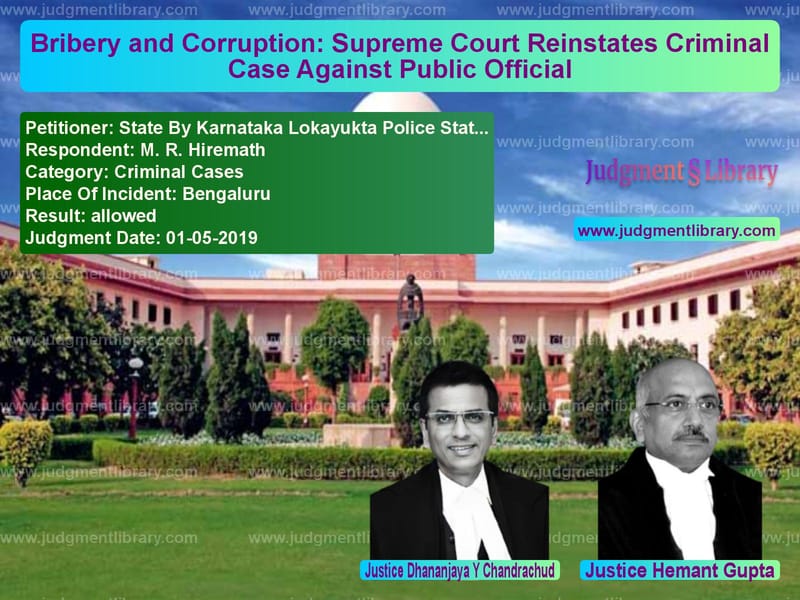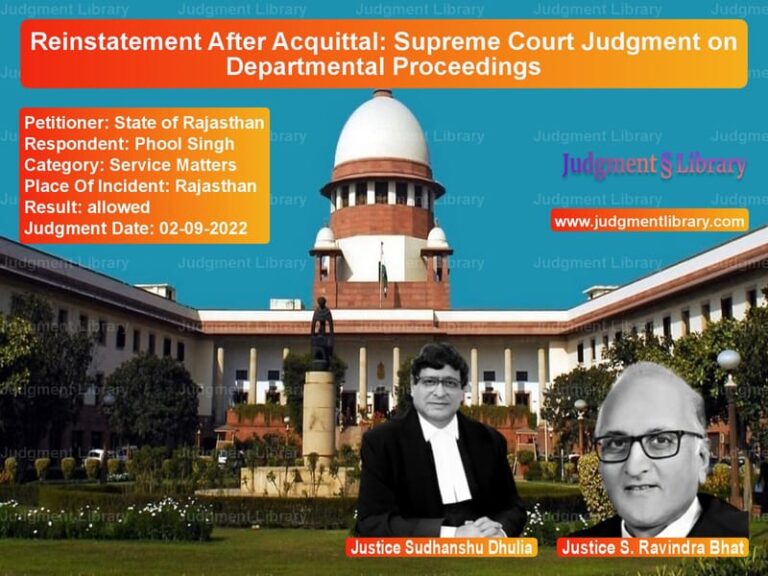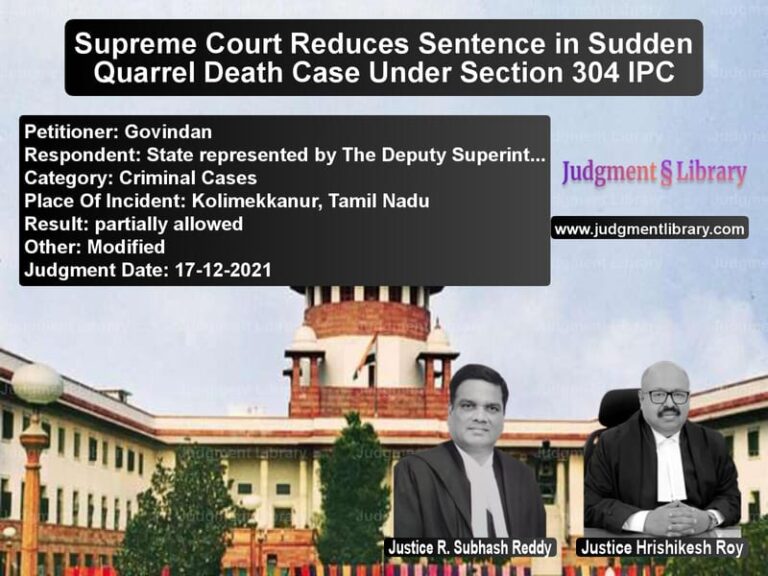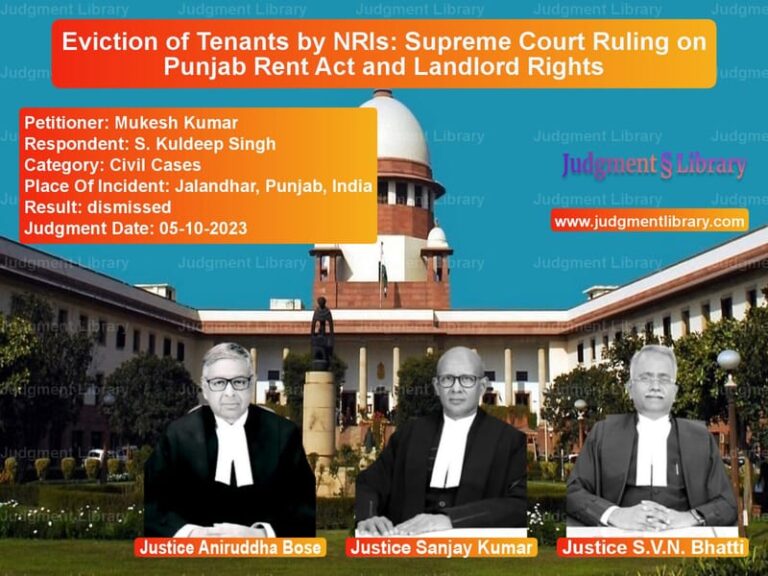Bribery and Corruption: Supreme Court Reinstates Criminal Case Against Public Official
The Supreme Court of India, in the case of State By Karnataka Lokayukta Police Station, Bengaluru vs. M. R. Hiremath, delivered a significant ruling regarding corruption and bribery in public office. This case involved allegations of bribery against a Deputy Commissioner of the Land Acquisition Section in the Bangalore Development Authority (BDA). The case delves into the admissibility of electronic evidence under the Indian Evidence Act, the role of preliminary inquiries before filing a First Information Report (FIR), and the limitations of Section 482 of the Code of Criminal Procedure (CrPC) in quashing criminal proceedings.
The Supreme Court set aside the Karnataka High Court’s judgment, which had discharged the accused on the basis of inadmissibility of electronic evidence. The judgment reaffirms the principle that corruption cases must be thoroughly investigated and cannot be dismissed at a preliminary stage without a trial.
Background of the Case
The accused, M. R. Hiremath, served as the Deputy Commissioner in the Land Acquisition Section of BDA. He was accused of demanding and accepting a bribe through an intermediary (Advocate) in return for processing a denotification request of certain lands. The Lokayukta Police had set up a sting operation where conversations were recorded using a spy camera.
Following the sting operation, a complaint was filed, and a charge sheet was submitted, framing charges under Sections 7, 8, 13(1)(d) read with Section 13(2) of the Prevention of Corruption Act, 1988.
Arguments by the Petitioner (State by Karnataka Lokayukta)
The prosecution, represented by Mr. Joseph Aristotle S., argued the following:
- The High Court wrongly quashed the proceedings by holding that a certificate under Section 65B of the Indian Evidence Act was mandatory at the charge sheet stage.
- Electronic evidence can be introduced later during the trial, and its admissibility can be decided at that stage.
- Apart from the electronic evidence, the prosecution had other corroborative evidence against the accused.
- The High Court’s interference at the discharge stage was premature and unwarranted.
Arguments by the Respondent (M. R. Hiremath)
The defense, led by Mr. Basava Prabhu Patil, contended:
- The entire case relied on the spy camera recording, which was inadmissible in evidence due to the absence of a Section 65B certificate.
- The investigation had commenced before the registration of the FIR, which was illegal under the guidelines set in Lalita Kumari vs. Govt. of Uttar Pradesh.
- The intermediary (Advocate) caught in the trap did not name the respondent in the bribery scheme.
- Since the prosecution failed to produce the 65B certificate, the High Court was justified in quashing the case.
Key Observations by the Supreme Court
The Supreme Court thoroughly analyzed the issues raised and made the following crucial observations:
1. Certificate Under Section 65B of the Indian Evidence Act
- The Court reaffirmed the precedent set in Anvar P.V. vs. P.K. Basheer, stating that electronic evidence requires a certificate under Section 65B for admissibility.
- However, such a certificate is required at the trial stage and not at the stage of filing the charge sheet or framing charges.
- The High Court erred in assuming that the absence of the certificate at the charge sheet stage rendered the entire prosecution case void.
2. Validity of Preliminary Inquiry
- In corruption cases, preliminary inquiries are permitted before the registration of an FIR, as established in P. Sirajuddin vs. State of Madras and Lalita Kumari.
- The police handing over a spy camera to the complainant did not amount to an illegal investigation; it was merely a step in a preliminary inquiry.
- The FIR was registered only after sufficient material was gathered to establish a cognizable offense.
3. High Court’s Erroneous Discharge Order
- The High Court wrongly assumed that the prosecution’s case relied solely on electronic evidence and overlooked other supporting evidence.
- At the discharge stage, the Court should have assumed the prosecution’s evidence as true instead of evaluating its probative value.
- The High Court conducted a “mini-trial” at the discharge stage, which was legally impermissible.
Final Judgment
The Supreme Court set aside the High Court’s order and reinstated the criminal case against the accused. It held that:
- Electronic evidence can be introduced at the trial stage with the necessary certification.
- Corruption cases cannot be quashed prematurely when other supporting evidence exists.
- The trial court was correct in rejecting the accused’s discharge plea, and the case must proceed to trial.
Legal Implications of the Judgment
This ruling has several important legal implications:
1. Strengthening Anti-Corruption Laws
- The ruling reinforces the message that corruption allegations against public officials must be thoroughly investigated and prosecuted.
- Public officials cannot escape trial merely due to procedural technicalities at the charge sheet stage.
2. Clarity on Section 65B Certification
- The judgment settles the debate on when a Section 65B certificate is required, clarifying that it is mandatory only at the stage of producing electronic evidence during trial.
- This prevents accused persons from prematurely challenging investigations based on electronic evidence.
3. Limits of High Court’s Powers Under Section 482 CrPC
- The judgment underscores that High Courts cannot conduct a detailed examination of evidence at the discharge stage.
- Courts must assume prosecution evidence as true and proceed to trial unless the case is frivolous or maliciously instituted.
Conclusion
The Supreme Court’s ruling in State By Karnataka Lokayukta Police Station vs. M. R. Hiremath serves as a landmark judgment in anti-corruption law. By reinstating the criminal case, the Court has reaffirmed that procedural lapses cannot override substantive allegations of corruption. The decision strengthens the enforcement of the Prevention of Corruption Act, ensuring that public officials are held accountable for their actions.
Moreover, the judgment provides clarity on electronic evidence admissibility and the role of preliminary inquiries in corruption cases. It ensures that investigations are conducted fairly while preventing accused individuals from exploiting legal technicalities to evade prosecution. This ruling is expected to serve as a guiding precedent in future corruption-related cases.
Petitioner Name: State By Karnataka Lokayukta Police Station, Bengaluru.Respondent Name: M. R. Hiremath.Judgment By: Justice Dhananjaya Y Chandrachud, Justice Hemant Gupta.Place Of Incident: Bengaluru.Judgment Date: 01-05-2019.
Don’t miss out on the full details! Download the complete judgment in PDF format below and gain valuable insights instantly!
Download Judgment: State By Karnataka L vs M. R. Hiremath Supreme Court of India Judgment Dated 01-05-2019.pdf
Direct Downlaod Judgment: Direct downlaod this Judgment
See all petitions in Fraud and Forgery
See all petitions in Custodial Deaths and Police Misconduct
See all petitions in Extortion and Blackmail
See all petitions in Judgment by Dhananjaya Y Chandrachud
See all petitions in Judgment by Hemant Gupta
See all petitions in allowed
See all petitions in supreme court of India judgments May 2019
See all petitions in 2019 judgments
See all posts in Criminal Cases Category
See all allowed petitions in Criminal Cases Category
See all Dismissed petitions in Criminal Cases Category
See all partially allowed petitions in Criminal Cases Category







